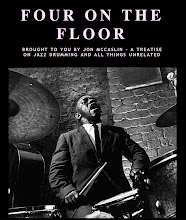It's not often that I feature non-drummers here on Four on the Four but I'm always willing to make exceptions for the likes of Toronto bassist Mike Downes. I first met Mike when I was still in high school back in the mid 90s and to this day I consider him to be one of the world's great Jazz bassists and he is one of the hardest working people I know. He is a consummate musician, a wonderful person and an example for us all to follow. Downes and his all-star band from Toronto (including Larnell Lewis on drums!) will be performing in Calgary on November 8th (sorry folks...this exclusive concert is already sold out!). On the eve of this highly anticipated performance and on the heels of his second (!) Juno award for his recent album "Root Structure", Mike was nice enough to take some time out of his busy schedule to answer a few questions about himself and his music.
Mike Downes - The Four on the Floor Interview October 2018
1) Tell us about your latest recording!
My latest recording is called “Root Structure.” It won the 2018 JUNO for Jazz Album of the Year: Solo and is a follow up to our 2014 JUNO winning album “Ripple Effect.” It features 2016 JUNO winner Robi Botos, two-time Grammy winner Larnell Lewis (with Snarky Puppy), JUNO winner/nominee Ted Quinlan and myself.
2) How did you choose your repertoire and sidemen?
From my liner notes: “In music and life, I’ve always been interested in what lies beneath the surface: the underlying structures that hold everything together, the strength that resides deep down. The music in this recording was composed and performed in this spirit.”
In a more tangible sense, I had recorded music for an 11-piece group (“In the Current”) and I distilled many of the musical colours and structural ideas from that large ensemble to expand the possibilities of the quartet. The musicians are some of my favourite musicians in the world. We have been playing together in many different contexts, and the musical chemistry is magical.
3) What inspired you to pursue the vibe and instrumentation that you did?
I wanted to have the intimacy of a quartet, yet use different guitar/keyboard, etc. timbres to expand the sonic palette of the quartet. I have often recorded with horns, but I was hearing something else for this recording.
4) Was there a particular message you were trying to convey to the listener?
All of my compositions have an emotional space that they occupy, and I try to make musical choices that bring that emotional space directly and powerfully to the listener. I don’t expect any two listeners to react the same way to the music, but I do hope it stirs something inside them that inspires them to dig deeper in their own lives.
5) Who are your influences with regards to this style of writing and playing?
A few that come to mind are Brian Blade and the Fellowship Band, Brad Mehldau, Wayne Shorter and Pat Metheny.
6) What are you practicing/studying/listening to/researching these days?
I’m listening to a lot of symphonic music. I’m writing more music for my 11-piece band, so I’m listening to Gil Evans, Bob Brookmeyer and other composers/arrangers. As far as practicing, I’m so busy that I’m mostly practicing music that I have to perform or record! When I get a chance, I’ve been working on independence exercises as well.
7) What other current and future projects do you have on the go at the moment?
I have a bunch of projects on the go. I produced an album that will be released this month with Ron Davis entitled “SympRONica UpFront” for jazz group and string quartet, I am co-producing a Joni Mitchell project with Yvette Tollar, I’m writing arrangements for a show with Molly Johnson and orchestra, writing music for my next recording, and playing with a lot of great musicians.
8) How does the bass and your overall approach to rhythm factor into your compositions and concept?
I rarely write music on the bass, but I always treat the bass line as a secondary (or even primary) melody. In that respect, I am acutely aware of the top and bottom melodies in music. Rhythm always plays a huge part in my compositions and playing. Playing with rhythms brings me a lot of joy, so I’m sure that factors into my music in a big way.
9) What bassists (or other musicians) do you consider as influences?
I have far too many influences to name, but some of my favourite bassists include Ray Brown, Scott LaFaro, Oscar Pettiford, Israel Crosby, Paul McCartney and Edgar Meyer. Sonny Rollins, Clifford Brown and Hampton Hawes come to mind as players who have had a big influence on my approach.
10) What advice do you have for younger, aspiring jazz musicians?
Stay passionate, stay curious, be comfortable with a vision that is farther ahead of where you are now and work hard.
-------------------
Learn more about Mike Downes and his current activities over at his website: www.mikedownes.com





















No comments:
Post a Comment